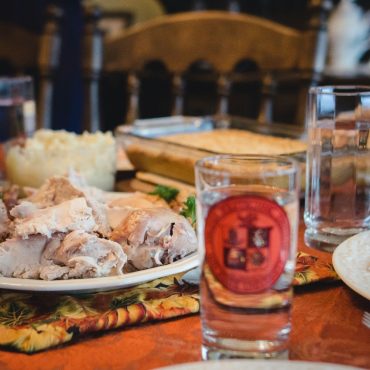-
 play_arrow
play_arrow
OchriO Streaming Live 24/7/365
-
 play_arrow
play_arrow
OchriO Live Stream
-
 play_arrow
play_arrow
London Calling Podcast Yana Bolder



We rejoice that God promises to forgive us when we confess our sins (1 John 1:9), but we need to remember that the tentacles of evil that spread from sinful choices go further and last longer than we might imagine.
Scripture:
2 Kings, chapter 21; 2 Chronicles, chapter 33; John, chapter 4
2 Chronicles 33:10-17 (NLT):
The Lord spoke to Manasseh and his people, but they ignored all his warnings. So the Lord sent the commanders of the Assyrian armies, and they took Manasseh prisoner. They put a ring through his nose, bound him in bronze chains, and led him away to Babylon. But while in deep distress, Manasseh sought the Lord his God and sincerely humbled himself before the God of his ancestors. And when he prayed, the Lord listened to him and was moved by his request. So the Lord brought Manasseh back to Jerusalem and to his kingdom. Then Manasseh finally realized that the Lord alone is God!
After this Manasseh rebuilt the outer wall of the City of David, from west of the Gihon Spring in the Kidron Valley to the Fish Gate, and continuing around the hill of Ophel. He built the wall very high. And he stationed his military officers in all of the fortified towns of Judah. Manasseh also removed the foreign gods and the idol from the Lord’s Temple. He tore down all the altars he had built on the hill where the Temple stood and all the altars that were in Jerusalem, and he dumped them outside the city. Then he restored the altar of the Lord and sacrificed peace offerings and thanksgiving offerings on it. He also encouraged the people of Judah to worship the Lord, the God of Israel. However, the people still sacrificed at the pagan shrines, though only to the Lord their God.
The Tentacles of Evil
The story of Manasseh, in 2 Kings 21 and 2 Chronicles 33, does not start well: “He did what was evil in the Lord’s sight, following the detestable practices of the pagan nations that the Lord had driven from the land ahead of the Israelites” (2 Chronicles 33:2). From there, it just got worse! He set up altars for idol worship in the Temple, and brought in an idol that he himself had made. God even said, “He is even more wicked than the Amorites, who lived in this land before Israel” (2 Kings 21:11).
But, as our passage for today indicates, King Manasseh and his people…ignored all [the Lord’s] warnings. So God allowed him to be taken prisoner by the Assyrians – a detail which 2 Chronicles includes, but 2 Kings does not. And here’s another detail 2 Chronicles supplies: While in deep distress, Manasseh sought the Lord his God and sincerely humbled himself before the God of his ancestors. And when he did that, the Lord listened to him and was moved by his request. After years of wickedness and leading the people astray, when he finally called out to God, God listened.
As we read on in 2 Chronicles chapter 33, we find that Manasseh worked to “fix” what he had done. He rebuilt the city walls, got rid of the idols and the altars he had constructed in the Temple grounds, restored the altar of sacrifice to the Lord, and encouraged the people to worship the Lord. But even with all of his efforts to “fix” things, not everything was right. “The people still sacrificed at the pagan shrines, though only to the Lord their God” (2 Chronicles 33:17). And when Manasseh died and his son Amon became king, Amon went right back to the idolatry and evil that Manasseh had done for so long.
The Tentacles of Evil Impact Other People
It’s interesting that 2 Kings does not include the story of Manasseh’s repentance and efforts to restore proper worship in Israel, while 2 Chronicles does. In fact, 2 Chronicles seems to point out this fact. “The rest of the events of Manasseh’s reign, his prayer to God, and the words the seers spoke to him in the name of the Lord, are recorded in The Book of the Kings of Israel.Manasseh’s prayer, the account of the way God answered him, and account of all his sins and unfaithfulness are recorded in The Record of the Seers” (2 Chronicles 33:18-19).
We could speculate on why the two accounts differ. Were the writers of 2 Kings trying to demonstrate why God’s judgment had ultimately come to Judah? Were the Chroniclers showing God’s mercy to those who repent and return to him? Perhaps both things are true. But rather than focusing on why, God is directing my attention to Manasseh’s repentance – and Amon’s return to idolatry.
Manasseh’s wickedness impacted many, many people. He led them into idolatry and evil practices. Later, he repented, and he worked to “undo” the evil he had done. But he couldn’t undo it all. The people continued to offer sacrifices at pagan shrines – although the passage points out that they were sacrificing to God. But even though they were sacrificing to God, they were not obeying what God had commanded.
The Tentacles of Evil Outlast Their “Author”
When Manasseh returned from his captivity, he worked to undo the evil he had done. He tore down the idols and pagan altars, rebuilt the altar to the Lord at the Temple, and encouraged the people to worship God. He tried to set a good example. But when he died, his son Amon became king. “[Amon] did what was evil in the Lord’s sight, just as his father, Manasseh had done. He worshiped and sacrificed to all the idols his father had made. But unlike his father, he did not humble himself before the Lord. Instead, Amon sinned even more” (2 Chronicles 33:21-23).
We need to remember that what may seem like a temporary act of disobedience has tentacles that will stretch much farther than we recognize, and last much longer than we imagine. Manasseh’s son Amon watched his father’s idolatry and evil practices, and that’s what he learned. Manasseh repented – but Amon did not. Manasseh escaped the tentacles of evil, but Amon did not. Everything we do impacts others – for evil, or for good. What we do matters!
Prayer:
Father, thank you for reminding us of your mercy and your grace. When Manasseh repented and cried out to you, you listened, and restored him. It is never too late for us to turn to you!
But we also thank you for reminding us that what we do matters. The tentacles of evil that spread from evil acts and attitudes stretch far beyond us. Even though you hear us and forgive when we repent, that does not undo the impacts of our sinful choices. Help us to recognize the importance of faithful daily obedience, and to walk in your way today. Amen.
Written by: OchriO
Similar posts
Recent Comments
No comments to show.Featured post

Latest posts
Current show

Edify
Presented by Dj Ross
For every Show page the timetable is auomatically generated from the schedule, and you can set automatic carousels of Podcasts, Articles and Charts by simply choosing a category.
closeUpcoming shows

Effulgent Amandla!!!
Presented by Dj Ross
12:00 - 15:00
Unretouched Amandla!!!
Presented by Dj Ross
15:00 - 18:00
Stratagem Amandla!!!
Presented by Dj Ross
18:00 - 21:00
Kindle Amandla!!!
Presented by Dj Ross
21:00 - 00:00
Intercession Amandla!!!
Presented by Dj Ross
00:00 - 03:00Chart












Post comments (0)